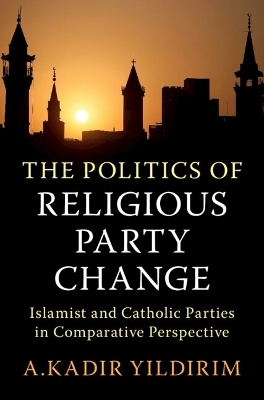
The Politics of Religious Party Change
Islamist and Catholic Parties in Comparative Perspective
Seiten
2023
Cambridge University Press (Verlag)
978-1-009-17074-1 (ISBN)
Cambridge University Press (Verlag)
978-1-009-17074-1 (ISBN)
This book uses comparative analysis to examine ideological change and secularization of religious political parties. It traces the similar historical origins of Islamist and Catholic parties in the Middle East and Western Europe, chronicles their conflicts with existing religious authorities, and analyzes their subsequently divergent paths.
The Politics of Religious Party Change examines the ideological change and secularization of religious political parties and asks: when and why do religious parties become less anti-system? In a comparative analysis, the book traces the striking similarities in the historical origins of Islamist and Catholic parties in the Middle East and Western Europe, chronicles their conflicts with existing religious authorities, and analyzes the subsequently divergent trajectories of Islamist and Catholic parties. In examining how religious institutional structures affect the actions of religious parties in electoral politics, the book finds that centralized and hierarchical religious authority structures - such as the Vatican - incentivize religious parties to move in more pro-system, secular, and democratic directions. By contrast, less centralized religious authority structures - such as in Sunni Islam - create more permissive environments for religious parties to be anti-system and more prone to freely-formed parties and hybrid party movements.
The Politics of Religious Party Change examines the ideological change and secularization of religious political parties and asks: when and why do religious parties become less anti-system? In a comparative analysis, the book traces the striking similarities in the historical origins of Islamist and Catholic parties in the Middle East and Western Europe, chronicles their conflicts with existing religious authorities, and analyzes the subsequently divergent trajectories of Islamist and Catholic parties. In examining how religious institutional structures affect the actions of religious parties in electoral politics, the book finds that centralized and hierarchical religious authority structures - such as the Vatican - incentivize religious parties to move in more pro-system, secular, and democratic directions. By contrast, less centralized religious authority structures - such as in Sunni Islam - create more permissive environments for religious parties to be anti-system and more prone to freely-formed parties and hybrid party movements.
A. Kadir Yildirim is Fellow for the Middle East at Rice University's Baker Institute for Public Policy. He holds a Ph.D. in Political Science from the Ohio State University.
1. Explaining religious party change; 2. Catholic and Islamic religious institutions; 3. Anticlericalism, religious revival, and the rise of religious political identities; 4. The origins of religio-political identity; 5. Intra-party conflict.
| Erscheinungsdatum | 19.12.2022 |
|---|---|
| Reihe/Serie | Cambridge Studies in Social Theory, Religion and Politics |
| Zusatzinfo | Worked examples or Exercises |
| Verlagsort | Cambridge |
| Sprache | englisch |
| Maße | 158 x 235 mm |
| Gewicht | 640 g |
| Themenwelt | Religion / Theologie ► Christentum ► Kirchengeschichte |
| Geisteswissenschaften ► Religion / Theologie ► Islam | |
| Sozialwissenschaften ► Politik / Verwaltung | |
| ISBN-10 | 1-009-17074-0 / 1009170740 |
| ISBN-13 | 978-1-009-17074-1 / 9781009170741 |
| Zustand | Neuware |
| Haben Sie eine Frage zum Produkt? |
Mehr entdecken
aus dem Bereich
aus dem Bereich
von Athanasius bis Gregor dem Großen
Buch | Softcover (2024)
C.H.Beck (Verlag)
12,00 €
eine Geschichte der christlichen Kunst
Buch | Hardcover (2024)
C.H.Beck (Verlag)
32,00 €


